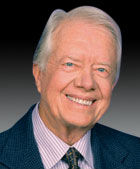 Jimmy Carter has done more since retiring from the office of president than most people accomplish in a lifetime. The author of more than 20 books, he is recognized worldwide for his leading work in conflict resolution, diplomacy, and humanitarian work.
Jimmy Carter has done more since retiring from the office of president than most people accomplish in a lifetime. The author of more than 20 books, he is recognized worldwide for his leading work in conflict resolution, diplomacy, and humanitarian work.
Jimmy Carter served as the 39th president of the United States, from 1977 to 1981 and received the Nobel Peace Prize in 2002. He is founder of The Carter Center in Atlanta, Georgia, which works to promote peace, health, and human rights across the globe. A Sunday school teacher at Maranatha Baptist Church in Plains, Georgia, Carter and his wife, Rosalynn, are also well known as volunteers for Habitat for Humanity. Among his many books is Our Endangered Values: America’s Moral Crisis, which addresses the theme of morality in public leadership.
Notes from Bill Hybel’s interview of President Carter follow below.
Reflections on his presidency
- Leadership style – engineer, meticulous organizer
- What do you look for in people who add to your staff? Integrity (character), an overall compatibility with basic principles (philosophical agreement), know more about area they will lead than he does
- Fostered disagreement on the team rather than just compliance.
- Fired entire cabinet? Wanted to keep 14 of 17. Ask entire cabinet if they wanted to stay. The 3 he wanted to resign resigned on their own. In retrospect would have done it differently.
- At the age of 7 started harvesting and selling peanuts. At the age of 12 he had 5 rental homes.
- Biggest high of his presidency – Israel-Egypt peace agreement
- Worst moment – attempt to rescue hostages in Iran that failed
- Eventually negotiated the release of the hostages, but Iran held them until 5 minutes after he was no longer president
- Loss of election to Reagan. Election took place on the anniversary the hostages were taken, overshadowed the election. There was division in the Democrat party.
Racial issues
- “An Hour Before Daylight” 3 of the 5 most influential people in his life growing up were black. His life was shaped by black culture.
- Truman integrated the military while Carter was serving on a submarine.
Humanitarian Issues
- Jimmy Carter considered the greatest ex-president in history because of what he’s accomplished since leaving office.
- Has done Habitat for Humanity one week a year for the last 24 years.
- One of the things the church has not done is to help the poor. Absence of generosity of both money and time.
- Carter Center was intended to be a “mini-Camp David” where world leaders could meet and have Carter mediate. Has evolved into an organization where ¾ of budget goes to health care issues. Fills gaps. Gets involved where nobody wants to be involved.
- Believes the greatest problem we face today is the growing chasm between rich and poor.
- Received 2002 Nobel Peace Prize
- Don’t be timid and allow social pressures to cause us from the principles of Jesus
- War begets war
How often do we pray for peace as a church?
What stood out to you in this interview? What do you need to think on more? What do you want to do differently?
I really enjoyed Jimmy Carter. I think he is a wonderful man.
He has definitely made an impact in the world. He tries to emulate Christ, and continues to do so into his eighties.
First of all, I am not a Jimmy Carter fan, but you left out what I think was the most important thing he said. He stated that when searching for a Secretary of Defense he wanted someone who could foster military weaponry innovation and would have peace as their primary goal. I think this says a great deal about hos character and objectives and we could learn a lot from that one point. As leaders in the work place or in ministry we are often thrown into the battle of being innovative, which could be costly (even to human resources) or serving the needs of others. For me, this point requires a lot more thought.
MeauxJi picked up on something that I missed, too. Perhaps the challenge is this battle of leading is to do both the innovative weapon development (in the case of the church effective outreach and programs that God can use) and all the while working for peace as Jesus would have us do. I may have missed the point, but it seems to me that we need to be innovative to reach the lost and develop the already decided – (the Christians within the church;) while working to bring peace or positive resolution to the issues we are facing.
Stand ready, be equipped. Move forward with God’s message.